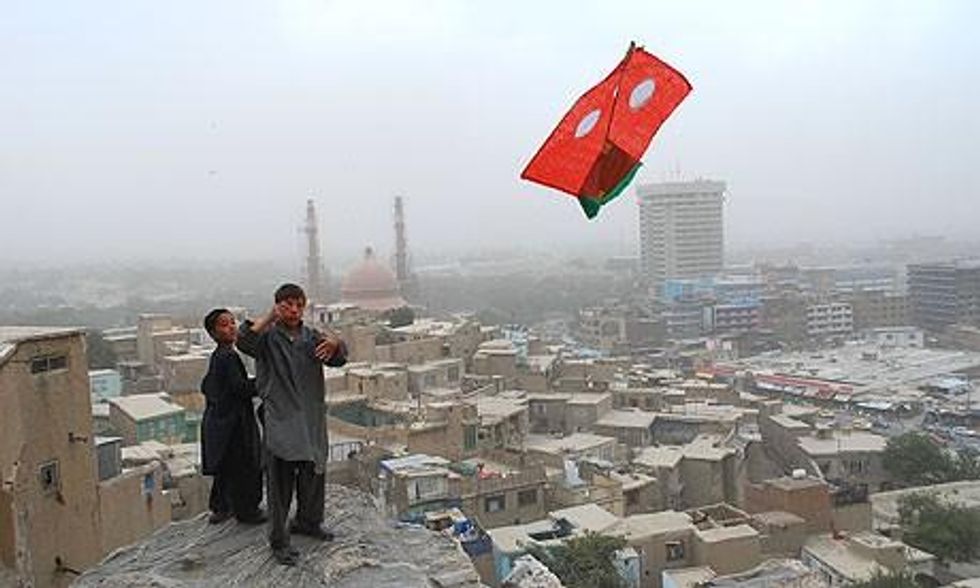Here in Afghanistan, survival - physical, cultural, and psychosocial - is a pressing and inescapable reality, a day-to-day struggle against odds for many people, especially as the harsh Afghan winter arrives, and necessary preparations for it are compromised by poverty, violence, and displacement. Women and children are at the front lines of the struggle.
Every morning, at the Afghan Peace Volunteers' (APVs) home in western Kabul, sixteen women come to a tailoring class where they learn a valuable skill and dream of forming a sewing cooperative. Most of these women are mothers, coping with care of children and a household. Everyday, like their counterparts throughout Afghanistan, they struggle to feed and clothe their children, to support them in school, to obtain timely health care for them, to shepherd them into adulthood. In a country with thirty-six percent unemployment and widespread poverty, the dangers to women and children are real. In a country where one in eleven women die in childbirth, where psychological trauma from violence and the threat of violence is the norm, where the child mortality rate is among the world's highest, and acute malnutrition is a shameless and silent thief robbing mothers of their children and robbing children of their minds and bodies, the dangers are clear and present.
Women often shoulder these burdens alone, and stagger beneath their weight. Today, after the class, Zahara stayed behind to talk and broke down in a cascade of tears. "The public schools are no good... I cannot afford to send our children for private instruction...They need more, but I cannot help them..."
Every afternoon, after the sewing machines have been stored, and the rug swept with short-handled straw brooms, the tailoring room is transformed into an after-school tutoring class, co-taught by three APVs, Abdulai, Faiz, and Baqir. The class began with the hope of assisting some of the neighborhood's young street children, kids who've been pulled out of school, in desperation, by their families, to hawk items such as gum, candy, and cigarettes in the midst of Kabul's heavy, stop-and-go traffic. The five street children who comprised the first classes were soon joined by another twenty-five neighborhood children whose parents want them to have the extra instruction, especially given the sad state of Afghanistan's educational system, one of the poorest in the world.
Two days ago, schools across Afghanistan celebrated ruz muallim, Teacher's Day, and a celebration for the after-school class was planned. Abdulai led the preparation, and during the preparatory cleaning and set up, carried out with great energy and care, he expressed his hope and fear. "I want the children to be happy today, the whole time they are here. Children in Afghanistan don't have much happiness. This is why we are having this celebration. I want to do this for them." And do this, he did.
And the children came. For over three hours, the house was filled with music, song, and high spirited children running, climbing, jumping, shouting and out-shouting each other. Some of the adults wished we had had ear plugs! The children brought simple gifts: a pen, plastic flowers, a card, and with a mixture of embarrassment and pleasure, gave them to their teachers. They read statements they'd written in honor of Faiz, Abdulai, and Baqir. They had a meal and then gleefully ate cookies and cake. Afterward, while we were cleaning, sixteen-year old Abdulai said to me, "With all the problems in Afghanistan, and all the suffering, what we did today was a great thing. When I think about it, I feel I am going to cry. Those children are the future of Afghanistan."
Later in the evening, I stood at the end of the second-floor hallway and looked out over the main street, a tangled chaos of foot, bicycle, and car traffic, busy with commerce. Beyond the honking of horns and the rumble of engines, a kite floated noiselessly. At first, when it drifted into view over the shops and above the low treetops, I did not recognize it as a kite. Unlike any kite I'd ever seen, it seemed to have no will of its own, and to be slowly, slowly "settling down," haphazardly lifting and falling in a very small space rather than tugging at its string and rising, a wafer almost perfectly weighted in the air. It did not reach for the heights, but rocked like a small boat on rough seas. In fact, when I first noticed it was a kite, I realized I had been aware of it peripherally for the last half hour, assuming it was a thin square piece of trash, a little too heavy to launch itself up into the stronger currents. But suddenly there it was, a kite, over Kabul, and what had appeared to me at first to be a hapless scrap, was in fact carefully wrought and masterfully flown. It danced and rocked just out of reach of tree branches and wires, never far from disaster and rescued from it only by the strength of steadfast attention and by exquisite skill and timing.
Like the kite, and despite the years and their toll, the Afghan mothers we meet are still treading water, still holding on, still managing to care for their children, translating their longing for peace into care for the next generation. And the children? They are flying the kites, asking only for an opportunity to develop their skills and use them for freedom, and happiness.

